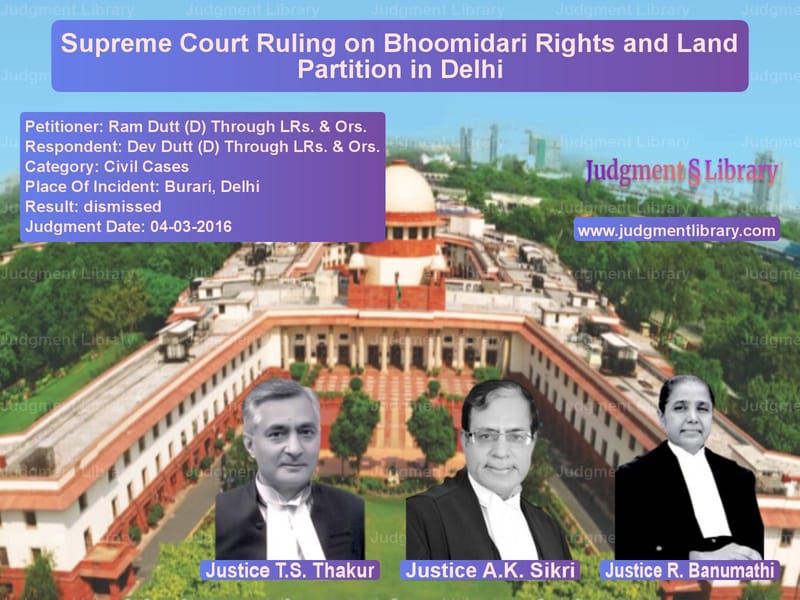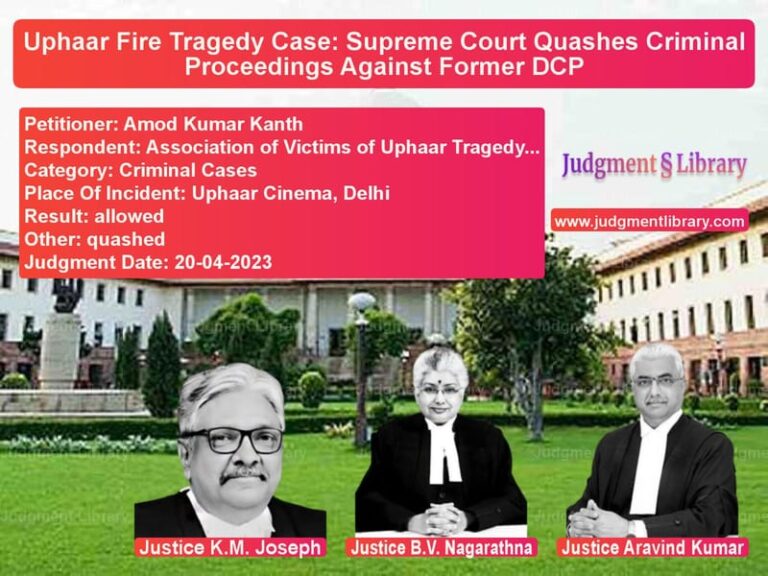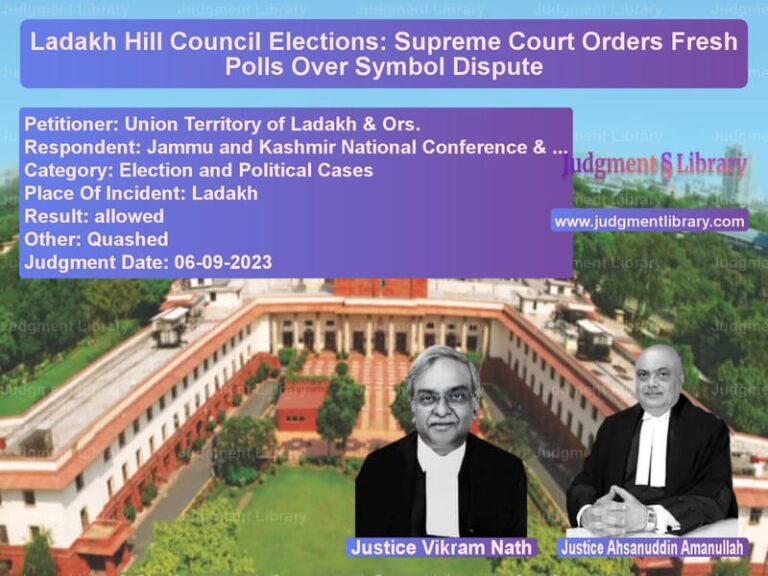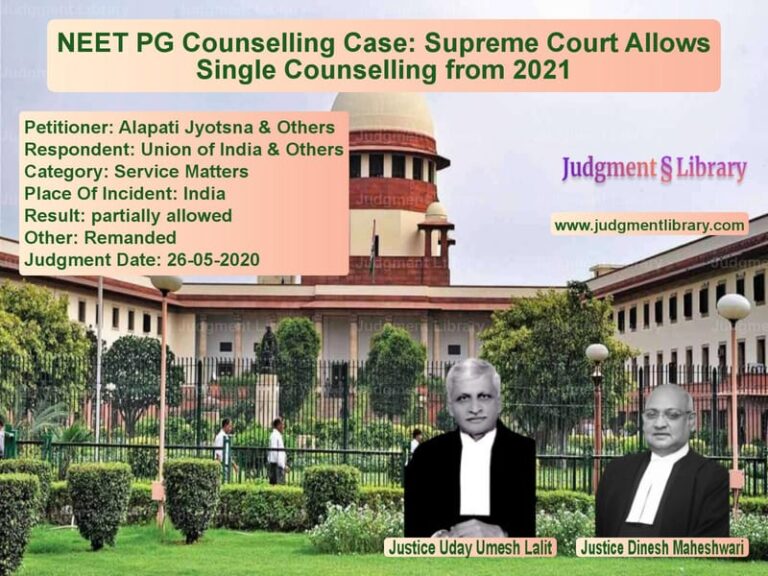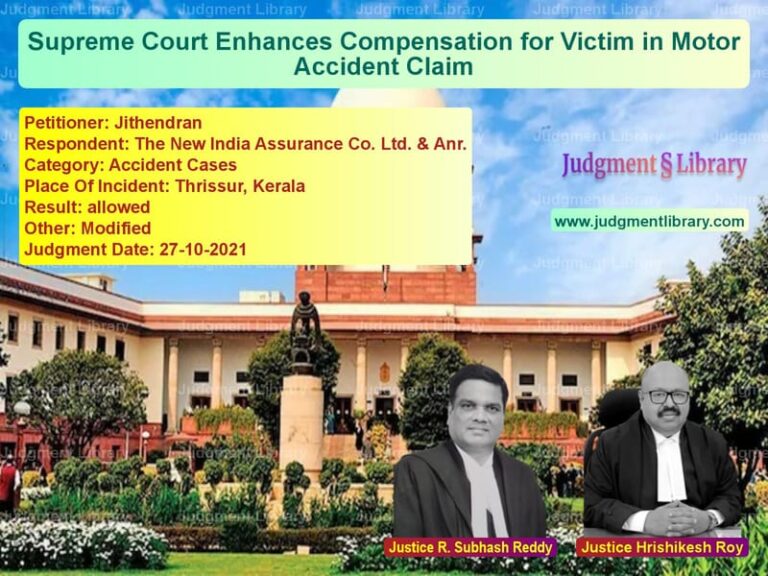Supreme Court Ruling on Bhoomidari Rights and Land Partition in Delhi
The Supreme Court of India, in the case of Ram Dutt (D) Through LRs. & Ors. vs. Dev Dutt (D) Through LRs. & Ors., dealt with a long-standing dispute over Bhoomidari rights and land partition in the Revenue Estate of Burari, Delhi. The judgment, delivered by Chief Justice T.S. Thakur, Justice A.K. Sikri, and Justice R. Banumathi, upheld the decisions of the lower courts, denying the appellants’ claim to an additional 94 bighas and 15 biswas of land.
Background of the Case
The case revolved around land ownership and Bhoomidari rights among family members. The appellants and respondents belonged to the same family and jointly owned land in Khewat Nos. 73 and 85 in Burari, Delhi. After the enactment of the Delhi Land Reforms Act, 1954, disputes arose regarding the rightful ownership and partition of the land.
The private respondents initiated proceedings under Section 11 of the Act, claiming joint Bhoomidari rights. While the Revenue Assistant and the first appellate authority ruled against them, the Financial Commissioner ruled in their favor in 1979. The Consolidation Officer later implemented this decision in 1982, modifying the land allotments.
Key Legal Issues
- Do the private respondents have a rightful claim as Bhoomidars?
- Was the Consolidation Officer authorized to modify allotments post-consolidation proceedings?
- Can the appellants claim additional land beyond what was allotted to them?
Arguments of the Parties
Petitioner’s Arguments (Ram Dutt & Ors.)
The appellants contended that they were the sole Bhoomidars of the disputed land due to oral partition during consolidation proceedings in 1975-76. They argued that the Consolidation Officer had become functus officio (i.e., his authority had ended) and thus could not modify the allotments.
Respondent’s Arguments (Dev Dutt & Ors.)
The respondents maintained that they had legitimate Bhoomidari rights as co-sharers and that the 1979 Financial Commissioner’s decision had recognized this. They contended that the consolidation process was ongoing and that they were entitled to proper land allotment.
Supreme Court’s Observations
Justice A.K. Sikri, delivering the judgment, noted:
“The petitioners have not pleaded that the said 94 bighas 15 biswas of land or any part thereof was part of the holding in Khewat Nos. 73 and 85 of which the petitioners and the respondents were Bhumidars and in possession.”
The Court highlighted that the dispute over the additional 94 bighas and 15 biswas was not part of the original litigation. The Court ruled that the petitioners were attempting to reopen settled matters and that their claim should be pursued through appropriate legal remedies rather than re-litigation.
Final Verdict
The Supreme Court dismissed the appeal, affirming that the appellants’ claims lacked merit. The Court upheld the prior rulings that determined land allotment and reiterated that the appellants could seek legal remedies for any additional claims if permitted under law.
Don’t miss out on the full details! Download the complete judgment in PDF format below and gain valuable insights instantly!
Download Judgment: Ram Dutt (D) Through vs Dev Dutt (D) Through Supreme Court of India Judgment Dated 04-03-2016-1741853837464.pdf
Direct Downlaod Judgment: Direct downlaod this Judgment
See all petitions in Property Disputes
See all petitions in Judgment by T.S. Thakur
See all petitions in Judgment by A.K. Sikri
See all petitions in Judgment by R. Banumathi
See all petitions in dismissed
See all petitions in supreme court of India judgments March 2016
See all petitions in 2016 judgments
See all posts in Civil Cases Category
See all allowed petitions in Civil Cases Category
See all Dismissed petitions in Civil Cases Category
See all partially allowed petitions in Civil Cases Category

